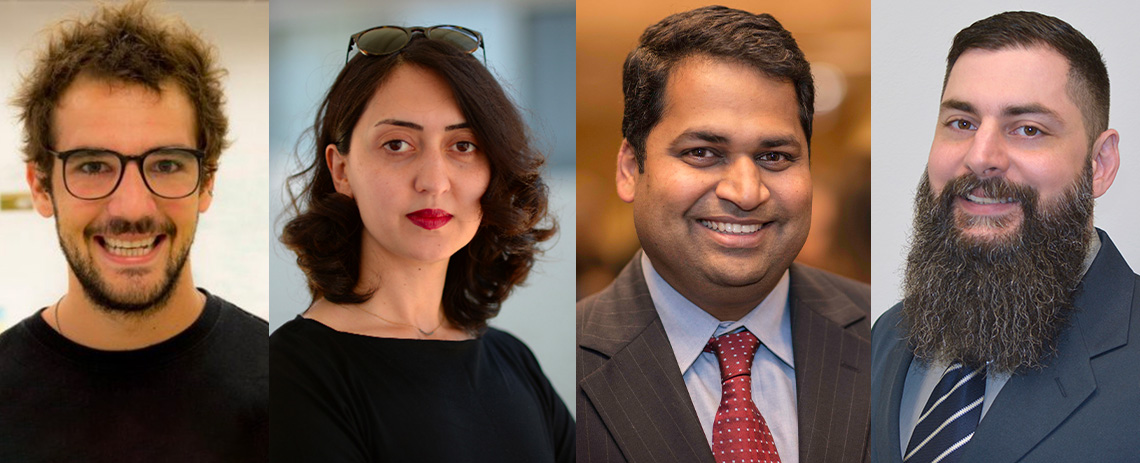ID’s PhDs Make their Mark
By Andrew Connor
July 8, 2020

ID was the first school in the US to offer the doctoral degree in design. At its May 2020 commencement, ID celebrated four PhD graduates: André Nogueira, Santosh Basapur, Maryam Heidaripour, and Roberto Faller. Their research and dissertations bring a host of diverse insights into the world.
“ID helped me see the world with new lenses. In today’s world, a PhD contribution—especially in design—is certainly not an individual achievement; rather it results from the hard work and achievements of those who preceded the student and the support and dedication of a network of people and institutions,” says André. “ID provides a platform for this to happen.”
André came to ID with a background in architecture, urban design, and geography, expecting to get another master’s in design, when associate professor Carlos Teixeira pointed out the possibilities of ID’s PhD program.
“After sitting with his invitation, I realized this was a unique opportunity to work exactly at the intersection of design, sustainability, and innovation, helping create new approaches for more sustainable and equitable futures, regardless if they were enabled by me or others,” says Nogueira.
Now André’s time at ID has culminated in a body of research that addresses the power dynamics leading to environmental injustice. As an Associate Researcher and Instructor at the Harvard T.H. Chan School of Public Health, Andre continues to explore alternate decision-making and design processes that promote sustainability and the well-being of people, organizations, and the natural environment.
Like André, Santosh Basapur has spent his time as a PhD student at ID devising new frameworks for addressing complex systems problems. Santosh, who will defend his dissertation this fall, started as an ID student following five years at Motorola Research Labs, where he met ID professor (now emeritus) Keiichi Sato working on projects addressing the future of mobile and home media experiences.
Santosh was impressed with ID’s research at the intersection of design, the social sciences, business and innovation. Keiichi’s Design Information Framework was an example of new thinking in design information management that enables designers to effectively organize, generate, evaluate and communicate their knowledge and insights.
“I was amazed at his viewpoint and how well he was articulating the Design Information Framework that he had developed with his PhD students,” says Santosh. “I started meeting with him and discussing a lot of research and philosophy around design of complex systems. This got me onto the path of PhD at IIT Institute of Design.”
Santosh’s research as a PhD student has focused on human-centered design of complex systems like transportation and healthcare.
Moreover, his dissertation integrates the field of semiotics into systems design, and proposes a method for designers that can incorporate peoples’ meanings and values into the design process. As Director of Design: Business Processes at Rush University Medical Center, Santosh is already putting his research at ID into application.
Finally, for Maryam Heidaripour, pursuing a PhD at ID meant finding a way to imagine and craft futures in which we can all thrive.
Informed by both philosophy and the feminist theory of temporality—which emphasizes an awareness of the past, present, and future to confront inequalities—Maryam studies how new worlds are designed and for whom they’re designed. Her research suggests that by adopting a greater awareness of time—one that goes beyond a simplistic linear notion—designers can shape alternative futures.
“Although shaping futures is an integral part of design, conventional design methods are mainly informed by present issues and concerns,” says Maryam. “I suggest incorporating a temporal lens along with more often practiced material and spatial lenses to diversify and deepen our engagement with what is yet to come. The result is a new way of practicing design that is deeply attuned to justice.”
Finally, Roberto Faller (PhD 2020) focused his research on human-technology relationships. Prior to his doctoral studies, Faller had studied the emotional response between humans and physical objects. But as an avid gamer and game designer, he spent his time at ID unearthing how games can helpfully immerse players in difficult topics.
Faller’s dissertation develops guidelines and frameworks for manipulating what’s known as the “magic circle,” or the situation in which players suspend their disbelief and devote themselves to the rules of the game. The “magic circle” offers a controlled space for interactive play. It’s where, he has found, people often feel more comfortable exploring topics like mental illness, trauma, or politics.
Though their research has focused them in different directions and industries, ID’s PhD graduates prioritize equity and inclusivity, sharing a commitment to building intelligent, responsible, and cooperative futures.